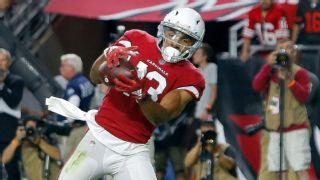|
TEMPE, Ariz. -- A board hangs by the door of Christian Kirk's condo. On it, he has written the critiques he hears: Too small. Too slow. Only a slot receiver. It's not something he reads every day, but the board is placed perfectly so he can see it every time he leaves and every time he comes home. Just a quick glance at it is enough. "I use it as motivation," Kirk said. "I'm a big believer in subliminal messages and being able to visualize. Every day I get to see that. I know I'm still out there to prove, and it just makes me work harder."  He has been proving his critics wrong all season. Kirk ranks second among NFL rookie receivers in receptions (31) and receiving yards (410), behind only Calvin Ridley of the Atlanta Falcons. He has been proving his critics wrong all season. Kirk ranks second among NFL rookie receivers in receptions (31) and receiving yards (410), behind only Calvin Ridley of the Atlanta Falcons.
Kirk read but never bought into his pre-draft scouting reports. And as the Arizona Cardinals begin the second half of their season Sunday in Kansas City, Kirk leads the team in receiving yards and yards per reception. Among receivers, he leads the team in nearly every major category, and if he's not leading it, he's No. 2 to future Hall of Famer Larry Fitzgerald. "It's, obviously, an awesome feeling just being able to perform at a standard that's very high," Kirk said. "I want to continue to do that. But I'm just taking every opportunity that I get right now." And a lot those opportunities are coming beyond the slot. Kirk, at 5-foot-11 and 200 pounds, says he believes he was labeled as too slow and too short because he played primarily in the slot at Texas A&M, where he caught 234 passes for 2,856 yards and 26 touchdowns in three seasons with the Aggies. But in the NFL, that has changed. Just 79 of his 227 routes have come out of the slot. That's 34 percent, a large drop from the reported 93 percent of snaps he took in the slot in college. The Cardinals have clearly never been concerned with his size or speed. "Not at all," coach Steve Wilks said. "It may have been a concern with other teams, but not with us. We felt like he had the speed. I know that was a question, 'He's just a slot receiver.' He's shown that he can take the top off." Wide receivers coach Kevin Garver said he thought Kirk had a "burst" to his game when he scouted him. Quarterback Josh Rosen, who has known Kirk since high school, said the labels were just a product of the uninformed. "I think a lot of people with certain criticisms don't really know exactly what to look for," Rosen said. "I think sometimes you just have to turn on tape and watch guys play. [Kansas City receiver] Tyreek Hill, on the other side, is one of the best receivers in football right now, and he's tiny. He's unbelievable. I think they're different kinds of receivers, but just in the sense that I think a lot of guys look at the wrong things. "If you turn on Christian's tape from college, he's ripping people up and down the field with NFL talent against him, as well." When Kirk was drafted in the second round by the Cardinals, he was open about what he didn't know, Garver said. The two spent "a lot of time together," Garver said, adding that Kirk soaked in the Cardinals' offense like a "sponge." "I think he's got the mental discipline, the mental disposition, to handle all this information," Garver said. Garver described Kirk as having a "very high" football IQ, which Kirk began cultivating at a young age. Starting when Kirk was 5 years old, his father, Evan, used to tell his son: "Nobody wants a dumb football player." He didn't just mean on the field. He meant in the classroom, too. But Evan stressed that Christian should be an all-around player so coaches wouldn't hesitate playing him at any position. "That always stuck with me," Christian said. "I always prided myself to know everything. In high school, I played running back, receiver, safety and corner. Just being able to be on both sides of the ball and be all over the place, just forced me to up my football IQ." Kirk's high school coach, Jason Mohns, at Saguaro High School in Scottsdale, Arizona, built on that by teaching Kirk how to dissect an offense and defense, find his keys, learn his reads. Then in college, Kirk's football education went to the "next level" as he learned the Aggies' playbook "inside and out." It all paid off when Kirk got to the NFL and had to learn new concepts and schemes within a new offense. "We can put Christian in a lot of different places," offensive coordinator Byron Leftwich said. "This guy's mind is not like a rookie. We move him around and we can put this guy in certain positions all over the field and he's capable of handling that from a mental standpoint. "And, obviously, what he can give you as a fast kid, getting out of breaks, liable to make the play, run after the catch once he catches it, he's just a good football player."
|
